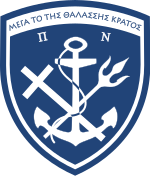
Back البحرية اليونانية Arabic Yunanıstan Hərbi Dəniz Qüvvələri Azerbaijani Военноморски сили на Гърция Bulgarian Řecké námořnictvo Czech Griechische Marine German Ελληνικό Πολεμικό Ναυτικό Greek Armada Griega Spanish نیروی دریایی یونان Persian Kreikan merivoimat Finnish Marine de guerre hellénique French
| Hellenic Navy | |
|---|---|
| Ελληνικό Πολεμικό Ναυτικό | |
 Hellenic Navy seal | |
| Founded | 1821 (de facto) 1828 (official) |
| Country | |
| Role | National defense |
| Size | c. 30,000 active personnel 180 warships & auxiliary boats, including: 13 frigates 10 submarines 19 missile boats 10 gunboats 9 tank-landing ships 6 patrol boats 7 SOC (Special Ops) 48 fleet support & other auxiliary ships 3 memorial ships 27 aircraft |
| Part of | Hellenic Armed Forces |
| Patron | St. Nicholas |
| Motto(s) | Μέγα τὸ τῆς θαλάσσης κράτος "Great is the nation that controls the sea"[1] |
| Colors | Blue, white & gold |
| March | "The Aegean Sailor" |
| Engagements | Greek War of Independence Greco-Turkish War (1897) Balkan Wars World War I Russian Civil War Greco-Turkish War (1919–1922) World War II Operation Golden Fleece UNIFIL Operation Desert Storm Operation Desert Shield Operation Sharp Guard Operation Enduring Freedom Operation Active Endeavour Operation IFITOS Operation Atalanta Operation Ocean Shield 2011 military intervention in Libya Operation Aginor War on Terror Operation Irini Operation Aspides |
| Website | Hellenic Navy |
| Commanders | |
| Chief of the Navy General Staff | Dimitrios E. Kataras |
| Notable commanders | Admiral Andreas Miaoulis Admiral Konstantinos Kanaris Admiral Pavlos Kountouriotis Vice Admiral Ioannis Demestichas |
| Insignia | |
| Identification symbol | ΠΝ |
| Naval ensign |  |
| Naval jack |  |
| Pennant | |
The Hellenic Navy (HN; Greek: Πολεμικό Ναυτικό, romanized: Polemikó Naftikó, lit. 'War Navy', abbreviated ΠΝ) is the naval force of Greece, part of the Hellenic Armed Forces. The modern Greek navy historically hails from the naval forces of various Aegean Islands, which fought in the Greek War of Independence. During the periods of monarchy (1833–1924 and 1936–1973) it was known as the Royal Hellenic Navy (Βασιλικόν Ναυτικόν, Vasilikón Naftikón, abbreviated ΒΝ).
The Hellenic Navy is a Green-water navy. The total displacement of the fleet is approximately 150,000 tons. The HN also operates a number of naval aviation units.[citation needed]
The motto of the Hellenic Navy is "Μέγα τὸ τῆς θαλάσσης κράτος" from Thucydides' account of Pericles' oration on the eve of the Peloponnesian War.[2][3] This has been translated as "The rule of the sea is a great matter".[1] The Hellenic Navy's emblem consists of an anchor in front of a crossed Christian cross and trident, with the cross symbolizing Greek Orthodoxy, and the trident symbolizing Poseidon, the god of the sea in Greek mythology. Pericles' words are written across the top of the emblem.
"The Navy, as it represents a necessary weapon for Greece, should only be created for war and aim to victory."
— Greek Government (1866)
- ^ a b Thucydides (1910). "1.143.5". The Peloponnesian War. London; New York: J. M. Dent; E. P. Dutton. At the Perseus Project.
- ^ Thucydides (1942). "1.143.5". Historiae in two volumes (in Greek). Oxford: Oxford University Press. At the Perseus Project.
- ^ Thucydides, History of the Peloponnesian War, 1.143.